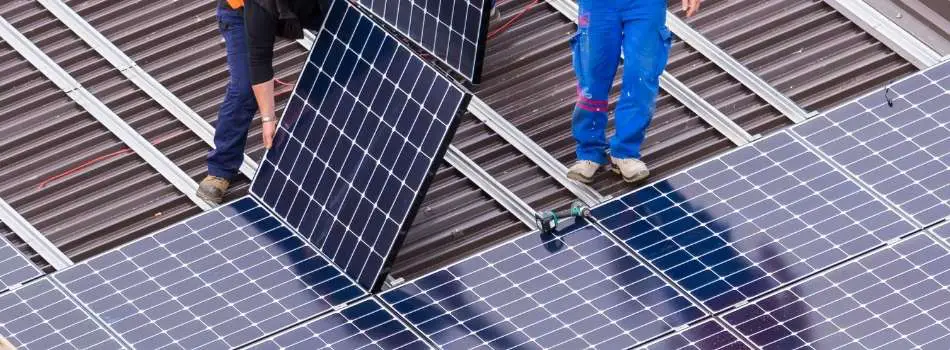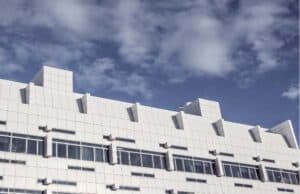Driving through almost any residential neighborhood in a sunny, warm city you’ll likely notice that many of the houses have solar panels. You may have also noticed that the vast majority of those panels were black…but why is that?
Generally, solar panels are black because the more light that is absorbed by a material, the hotter it will get. Black surfaces absorb sunlight and heat up more quickly. Since solar panels contain a layer of monocrystalline silicon, the sun reacts with them in a way that makes them look black.

Most people that own solar panels are likely just happy to know that they are reducing their grid electricity usage and working towards reducing their electric bill, but others…like me…might be on the lookout for other color options or more aesthetically pleasing solar power options.
Is Black The Best Option For Solar Panels?
Typically, homeowners will typically use black solar panels because they are less expensive than other color options and also because black solar panels produce the most electricity, roughly 25-30% more than other colors.
They are also durable enough for outdoor use or when installed in a shaded area of your roof so you won’t have to worry about discoloration from exposure to sunlight.
Another reason solar panels are typically black is that the solar cells are covered with a layer of silicon and together they create electricity from sunlight, which is often referred to as photovoltaic energy.
The more light that penetrates the surface, the hotter it becomes. Black surfaces absorb these rays quickest, thus making them hot enough for greater efficiency in converting solar energy into electricity.
There are many different kinds of solar panels on the market and each is designed for a specific purpose.
For example, while some models can’t be used in extreme weather conditions, others can withstand harsh winds and snow loads better than black ones. But when it comes to efficiency and cost-effectiveness, there’s no doubt that black solar panels are an excellent choice.
Black solar panels will usually contain less silicon, which helps keep the cost down but does reduce the lifespan a tiny bit. The average life expectancy for black solar cells is about 30 years which is great considering that it’s cheaper to install.
Do Solar Panels Need To Be Black?
In general, solar panels don’t need to be black, and you will usually have options of dark blue or dark green, depending on the company and pricing restrictions. Some companies, such as Kameleon and Sunovation produce multiple color options for solar panels.
In some cases, solar panels can come in other colors like blue or green and these cells tend to work better when placed on a roof with shade since their color reflects less light than black ones do.

This is beneficial for the owner since the cells will be cooler and produce more electricity.
Blue or green silicon cells are also extremely durable when it comes to extreme weather conditions so you don’t have to worry about them getting damaged by hail or snow.
Black solar panels are the most popular choice for homeowners because they offer a great balance of cost-effectiveness and efficiency, but if you’re looking for something different then there’s no real reason why you should limit yourself to black solar panels only.
While Colored Solar Panels aren’t as cost-effective as black or dark blue panels…and White Solar Panels are still more geared towards commercial use…you might be interested in more information on them since the cost will likely come down as production catches up with demand.
Do Black Solar Panels Absorb More Heat?
Generally, the black solar cells in solar panels absorb more heat than any other color option. Their ability to absorb more heat means they will be about 30% hotter on the surface and means they won’t cool down as quickly. This is what makes them so efficient.
Like I just mentioned, blacks panels are about 30% hotter on the surface than dark blue or green ones and they don’t cool down as quickly either.
This should be a benefit to homeowners because black solar panels will produce more electricity in the long run and pay for themselves faster than other colors. However, if you decide that heat is an issue for your property then it’s important to remember these differences when choosing which color option is best.
Will Black Solar Panels Make My House Hotter?
Black solar panels can make your house warmer since they absorb and retain 30% more heat than solar panels of other colors. If your home is shaded then you won’t have as big an issue, but if there is no shade and a lot of sunlight, this could potentially lead to more heat being trapped inside your home.
Aside from the solar panels, a lot will depend on your roof. If your roof is dark in color then it will absorb more heat than a lighter colored or white one. You might also have ventilation issues in your attic which can cause your house to be more difficult to cool off.
It’s important to know that these panels absorb more heat than any other color option, which can be a good thing for homeowners because they’ll produce more electricity in the long run.
But if you’re concerned about them making your house hotter then it might be time to research other options like blue or green solar cells.
Final Thoughts
Black solar panels are the most popular choice for homeowners because they offer a great balance of cost-effectiveness and efficiency, but if you’re looking for something different then there’s no real reason why you should limit yourself to black solar panels only.
While colored solar panels aren’t as cost-effective as black or dark blue ones, you might be interested in more information on them since the cost will likely come down as production catches up with demand.
White solar panels are also another option worth looking into, but it’s important to know that they’re not as efficient and so they can take quite a while to pay for themselves. They do have some benefits like being able to work in low-light conditions and being able to provide enough power for a single appliance.
Always talk to your solar professional and remember to ask a ton of questions. Solar is a huge investment so planning out exactly what you want and what you expect to get out of them will save you a lot of issues in the future!
